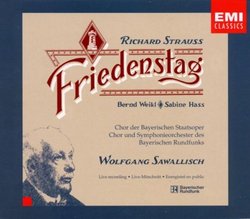Top flight recording of mediocre Strauss
Laon | moon-lit Surry Hills | 09/09/2001
(3 out of 5 stars)
"Maybe it's too early to be making this sort of judgement, but I'm increasingly coming to the view that the greatest 20th Century composer was Richard Strauss. The man has his faults: I wish Strauss wasn't so fluent at producing music when he had nothing much to say, so good at "note-spinning", as his wife Pauline used to call it... And that he was less modest: for example in opera he believed that Hugo von Hoffmanthal was an equally great artist, and toned back his orchestral power so that von Hoffmanthal's words could be clearly heard. That was a mistake. His modesty made him try less hard, as a composer, than he should have: he seems to have had the gifts to write greater music than he gave us. He thought of himself as "one of the best second-rate composers" but his best work in a range of formats, song, chamber, orchestral and operatic, is second to none in the great German tradition. And there is no other music from the 20th century to rival his best work. In particular he was a composer who could do things with an orchestra, and especially with an orchestra and a soprano, that no other composer could do. Not even Wagner. Not even Mozart. And it seems that I'm not the only one to be radically up-grading Strauss from the slightly patronising regard musicologists have been awarding him for the last 40-50 years. There is a full-scale revival in effect. So we are finding the obscure works come out from obscurity and into high-quality recordings. And as part of the market for that Strauss revival I'm prepared to listen to anything from "Little Richard" and to expect it to reward attention. It's part of the re-writing of the history of 20th century music, in which the academically approved people who wrote music that went "click buzzzt-whirr nee-naw-nee-naw", and so on, are fading away at the speed of French deconstructionists. The music-buying audience has pretty much rejected the 2nd Vienna School party-line and discovered the 20th century composers who wrote music that rewards attention and sounds good. This is the context for this review: my willingness to listen to even neglected Strauss, and the fact that this quickly-forgotten opera is now available in two competing recordings. Robert Bass's account, with James Woods as the Commandant, on the Koch label, can be quickly dismissed. The Bass-conducted set was an unambitious project, simply intent on filling a gap in the catalogue, offering lack-lustre singing, playing and recording. And now we have the Sawallisch. (There is also a historical recording of the work's premiere, which is not currently available, and which I haven't heard). I can certainly say, having heard two currently available recordings, that the Sawallisch recording is the one to get. It is the best possible advocacy this opera could have, a fully-committed performance that treats this ordinary work as if it were a great one. Sawallisch and his cast, including Bernd Weikl as the Kommandant and Sabine Hass as the Wife, make the best of the opera's advantages: some nicely discordant writing for the chorus's cries of hunger early in the opera, lushness for the scenes between the Kommandant and his wife, and a full and clear choral sound at the end, for the hymn of celebration when peace is finally achieved. It's almost enough to have you overlook the fact that the atonal choral effects for the hungry crowd are received, cliched; the music for baritone Kommandant and soprano wife is superbly orchestrated (naturally; Strauss wouldn't know how to orchestrate unimaginatively), but melodically extremely sparse; and the closing choral hymn is likewise an assemblage of effects without much in the way of real inspiration. But those closing choral pages are the best music in this opera. I once read a review comparing the close of _Friedenstag_ to the end of _Fidelio_; but the comparison is one that shows up the weakness of this opera at every point; in characterisation, in melody, in emotional impact, and so on. So: in sum, I came to this recording honestly pre-disposed to be impressed and to enjoy. And I can report that it is a very good performance. But it is Richard Strauss on auto-pilot, his composing hand writing skilfully while the well of inspiration was temporarily dry. There are some rewards here, but mostly this is one for Strauss opera completists.Cheers!Laon"


 Track Listings (26) - Disc #1
Track Listings (26) - Disc #1